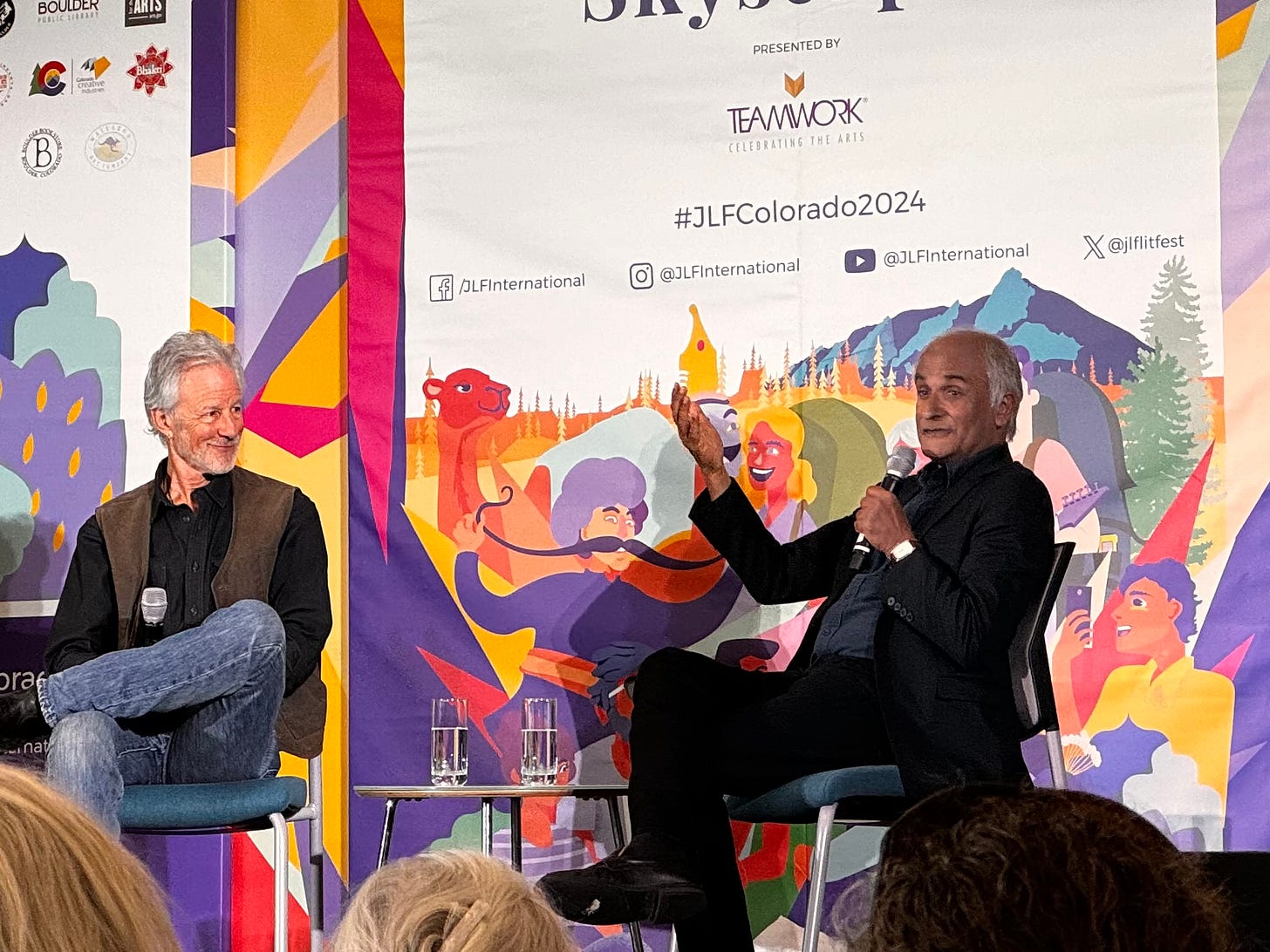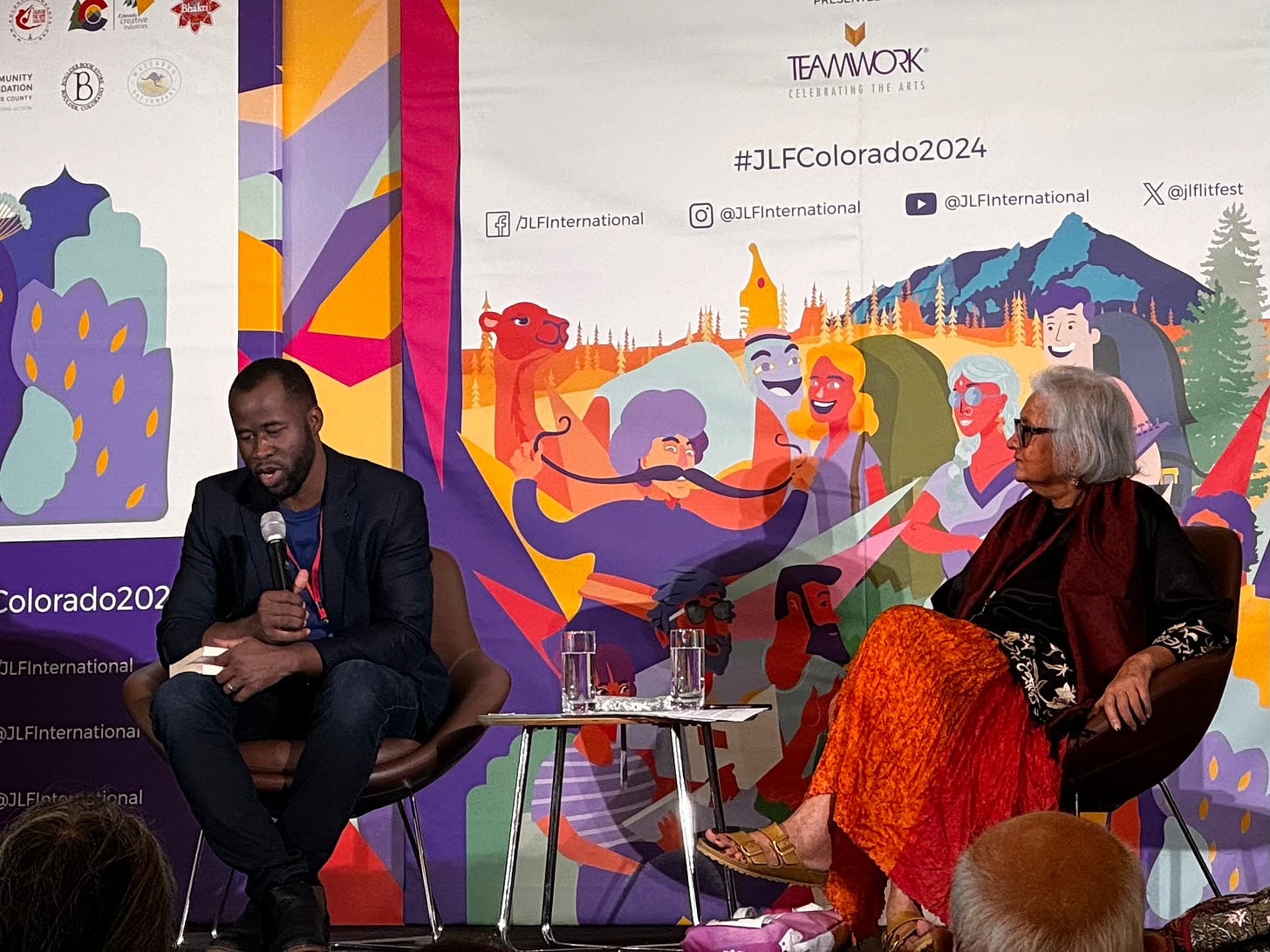Last Friday night at 2 am my time I entered a hotel room in Boulder to be greeted by this guy on the wall.
I was exhausted, and had flown to Colorado for the Boulder edition of the Jaipur Literary Festival, but I was not a speaker, so I had no real plan or agenda. Some of you know how disorienting that can be for me. Feeling both hungry and not-hungry in the way one can feel after a flight and time change, I selected the least unappealing snack available in the hotel lobby fridge—a two-part plastic container of garlic hummus and pretzels—and plopped myself onto the bed, wondering if flying all this way for one day (granted, with an airline credit to use up) had been a mistake.
It was not.
The Jaipur Literary Festival began some 17 years ago in, well, yeah. Jaipur, India. I've always wanted to attend, in part because it looks like so much fun, and in part because it takes place in Rajasthan, which has a piece of my heart. Over the last decade, the festival has become a global literary phenomenon, sending some of its offshoots throughout the US. One of the remarkable things about it is how fully it integrates the places, spaces, and communities in which it takes place.
Boulder Public Library



First let's talk about the absolutely stunning Boulder Public Library. Just look. So airy and bright. Full of spaces for reflection, for conversation, for performance. Nooks and crannies for reading—look at the Children's Hollow! Two gardens. A bridge over an actual babbling creek. An adorable café. A seed library. Artwork on the walls. A full-on theater. If I lived in Boulder I'd do all my writing here.



All the festival sessions were free to the public, and so I met many community members, some of whom, like a gentleman named George who grew up in Mussoorie, have a deep connection with India, and some of whom are simply drawn to the literary conversations and exchange of ideas. All of them said they look forward to this event every year. I can see why. Rather than landing in their library and taking over, the festival expands the library's reach and draws everyone in. A lot respect and appreciation is given to Boulder's own character, to the importance of the mountains, to local culture, to the city's history. The festival was not JLF in Boulder, but JLF Boulder, all together.
Morning music
The day began with "morning music," and I'm a convert. All festivals—all conferences, no matter the field—should begin with the opportunity to sit quietly in the presence of live music. The music of Maestro Saskia Rao-De Haas (Indian cello), her husband Pandit Shubhendra Rao (sitar), and Subrata Bhattacharya (tabla) filled the entire library. I was particularly entranced with Saskia-ji's music. I'm a sucker for the cello, which I find to be a deeply soulful instrument. Like my beloved dance teacher Gretchen Hayden has done with kathak, Saskia-ji embraced the Indian classical tradition and made it her own, coaxing gorgeous raags from her cello, and looking 100% like she belonged up there on the stage with the Indian musicians. The integrity and comfort with which she is a part of the musical group was reflected in the entire audience. A gorgeous coming together. (These three musicians will be performing in the Boston area on October 12th from 4-7 pm.)
The openness and generosity of the festival made for some deeply thoughtful sessions. Thoughtful in how they were assembled, and thoughtful in what the presenters shared. Some common themes emerged: how one finds and fosters hope and joy amidst suffering; the importance of getting untold stories into the world; the cultures of mountain people; how we move through the world as tourists or pilgrims; how we connect with place.
"The more the world goes global, the easier it is for us to become provincial."
I attended a conversation between Andrew Schelling (poet, essay writer, and translator) and the writer Pico Iyer for a discussion of Iyer's latest book, The Half Known Life. The two of them made so apt observations that I was scribbling in my notebook for most of the session. Iyer spoke of the impetus for this new book: how can the notion of paradise survive in places riven by violence or suffering? Kashmir, Jerusalem, Darfur... He went to many of these places in search of possibility in the context of a bleak landscape, to explore the idea that "the only paradise [he] could trust is the one [he] can find in real life." He and Schelling talked about the importance of traveling to "discomfortable places" and to consider whether one is going as a tourist—who tends to take and then leave—or as a pilgrim—who expects to be changed by the journey. Iyer pointed out that "the space of unknowing, which is the space of intimacy, is what brings us together," and he likened the things we do know to "a little tent in the Himalayas at night," which I found to be a beautiful image. Iyer, who is of Indian origin but grew up in England and lives in Japan, reminds us: "The more the world goes global, the easier it is for us to become provincial."
"Writers have a responsibility to be irresponsible."
Festival co-director Namita Gokhale and festival producer Sanjoy K. Roy of Teamwork Arts had a warm and thoughtful conversation about Namita's long career as a writer and literary champion. They were at times irreverent, at times serious, at times teasing each other in the way that longtime friends can. It was refreshing to hear Gokhale's perspective on being oneself and breaking rules. "Writers have a responsibility to be irresponsible," she said. And "I am against reason, but I am not against common sense." She spoke of how she'd not expected her first book, Paro Dreams of Passion, to be so controversial. People called it "indiscreet" but she said all she did was "I laughed at men... I found their masculinity ridiculous." Growing more serious, she alluded to Sita's treatment by her husband Rama in Hindu mythology, and the "collective wounding of Indian women." The conversation ended with this final bit of wisdom: "The world would be a better place with less conviction on each side."
"The knowledge keepers decide what to give you."
In a session about writing across genres and spanning different forms of narrative possibility, Ramya Reddy spoke of her decade-long labor of love, Soul of the Nilgiris, to document the life and culture of the indigenous population of the Nilgiri mountains of southern India. As a visual artist, she wanted to explore the mountain region through photography. But she quickly realized that photography was not the way in. In order to connect with the indigenous population and understand its relation to the natural environment, she had to leave her camera behind and "go in there as a pupil." It took a year of meeting with local residents without her camera for them to invite it back in. The result is "a personal tapestry of oral narratives, conversations, writings and over 300 photographs" all held together with a special hand-stitched binding. The use of different media, especially the stitching, made it impossible for Reddy to get the book published traditionally. The other two authors on the panel—Laura Pritchett, whose book Playing With (Wild) Fire incorporates the point of view of various animals affected by wildfire, as well as non-narrative sections of police reports, obituaries, and grant applications; and Nishi Chawla, author of several books of poetry as well as screenplays—told their tales of having to fund the publication of their works themselves because of their unconventional approaches. (This is why we need presses like Galiot!)
"A story of war is neither complete nor true unless it is told by both the living and the dead."
Speaking of unconventional points of view, Nigerian writer Chigozie Obioma's latest book, The Road to the Country, includes the dead as narrators. Obioma's first two novels, each shortlisted for the Booker Prize, cemented his style that intertwines myth and realism. His latest is set in Nigeria of the late 1960s, against the backdrop of civil war. He spoke in a humble, warm, and affable way about very difficult things. His half-Igbo, half-Yoruba protagonist travels in search of his brother and ends up conscripted as a soldier for Biafra in a war he does not fully understand. Obioma does not shy away from depicting injuries and the stories of the dead. In conversation with Obioma, Gokhale said: "The book is brutal and it reinstates the human capacity for joy."
Joy is infectious.
I spent only 24 hours at the festival, but it was a joyous, refreshing 24 hours. In addition to reflecting on the words of the presenters, I came away filled with great exchanges and concrete ideas. Notions of how to connect Saskia-ji's illustrated book on Indian classical music with Chhandika, the non-profit I co-founded which teaches kathak dance. Thoughts on a session proposal for another event with Parul Kapur, author of the AWP Prize-winning novel Inside the Mirror. Ideas for a Galiot Press event at this gorgeous library. The seeds of a possible collaboration with a poet and playwright. A plan for trying to get my own books into the Indian market.
It was a reminder of how important it is to try to make time, just show up, and be open to possibility. A reminder of the richness that's to be found in the confluence of ideas and people. This is what we humans are capable of. Deep reflection. Exchange. Respect. Freedom. Beauty. It sounds cheesy but it’s so true.








This is so great, I just want to thank you!
Wow, so much to take in within a day! Yet you did, beautifully.